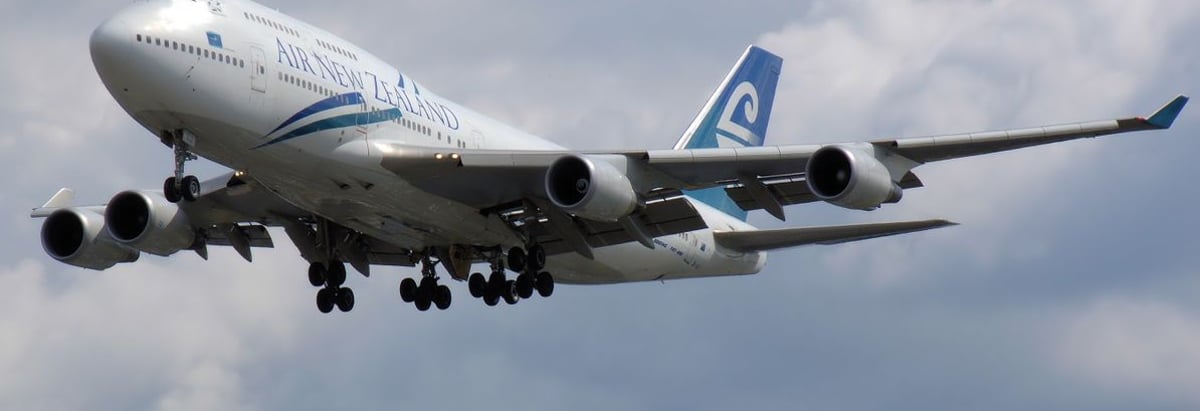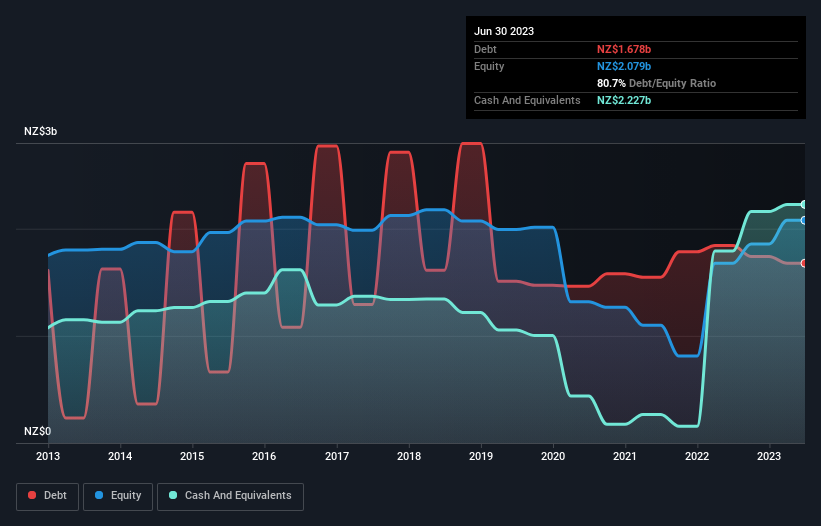- New Zealand
- /
- Airlines
- /
- NZSE:AIR
These 4 Measures Indicate That Air New Zealand (NZSE:AIR) Is Using Debt Extensively

The external fund manager backed by Berkshire Hathaway's Charlie Munger, Li Lu, makes no bones about it when he says 'The biggest investment risk is not the volatility of prices, but whether you will suffer a permanent loss of capital.' So it might be obvious that you need to consider debt, when you think about how risky any given stock is, because too much debt can sink a company. We note that Air New Zealand Limited (NZSE:AIR) does have debt on its balance sheet. But should shareholders be worried about its use of debt?
When Is Debt Dangerous?
Generally speaking, debt only becomes a real problem when a company can't easily pay it off, either by raising capital or with its own cash flow. Part and parcel of capitalism is the process of 'creative destruction' where failed businesses are mercilessly liquidated by their bankers. However, a more frequent (but still costly) occurrence is where a company must issue shares at bargain-basement prices, permanently diluting shareholders, just to shore up its balance sheet. By replacing dilution, though, debt can be an extremely good tool for businesses that need capital to invest in growth at high rates of return. When we think about a company's use of debt, we first look at cash and debt together.
See our latest analysis for Air New Zealand
How Much Debt Does Air New Zealand Carry?
As you can see below, Air New Zealand had NZ$1.68b of debt at June 2023, down from NZ$1.84b a year prior. But on the other hand it also has NZ$2.23b in cash, leading to a NZ$549.0m net cash position.

A Look At Air New Zealand's Liabilities
The latest balance sheet data shows that Air New Zealand had liabilities of NZ$3.84b due within a year, and liabilities of NZ$3.28b falling due after that. Offsetting these obligations, it had cash of NZ$2.23b as well as receivables valued at NZ$444.0m due within 12 months. So its liabilities total NZ$4.45b more than the combination of its cash and short-term receivables.
The deficiency here weighs heavily on the NZ$2.17b company itself, as if a child were struggling under the weight of an enormous back-pack full of books, his sports gear, and a trumpet. So we'd watch its balance sheet closely, without a doubt. After all, Air New Zealand would likely require a major re-capitalisation if it had to pay its creditors today. Air New Zealand boasts net cash, so it's fair to say it does not have a heavy debt load, even if it does have very significant liabilities, in total.
Although Air New Zealand made a loss at the EBIT level, last year, it was also good to see that it generated NZ$587m in EBIT over the last twelve months. When analysing debt levels, the balance sheet is the obvious place to start. But ultimately the future profitability of the business will decide if Air New Zealand can strengthen its balance sheet over time. So if you're focused on the future you can check out this free report showing analyst profit forecasts.
Finally, while the tax-man may adore accounting profits, lenders only accept cold hard cash. While Air New Zealand has net cash on its balance sheet, it's still worth taking a look at its ability to convert earnings before interest and tax (EBIT) to free cash flow, to help us understand how quickly it is building (or eroding) that cash balance. Happily for any shareholders, Air New Zealand actually produced more free cash flow than EBIT over the last year. There's nothing better than incoming cash when it comes to staying in your lenders' good graces.
Summing Up
Although Air New Zealand's balance sheet isn't particularly strong, due to the total liabilities, it is clearly positive to see that it has net cash of NZ$549.0m. And it impressed us with free cash flow of NZ$1.3b, being 213% of its EBIT. So while Air New Zealand does not have a great balance sheet, it's certainly not too bad. When analysing debt levels, the balance sheet is the obvious place to start. But ultimately, every company can contain risks that exist outside of the balance sheet. We've identified 1 warning sign with Air New Zealand , and understanding them should be part of your investment process.
If you're interested in investing in businesses that can grow profits without the burden of debt, then check out this free list of growing businesses that have net cash on the balance sheet.
If you're looking to trade Air New Zealand, open an account with the lowest-cost platform trusted by professionals, Interactive Brokers.
With clients in over 200 countries and territories, and access to 160 markets, IBKR lets you trade stocks, options, futures, forex, bonds and funds from a single integrated account.
Enjoy no hidden fees, no account minimums, and FX conversion rates as low as 0.03%, far better than what most brokers offer.
Sponsored ContentNew: Manage All Your Stock Portfolios in One Place
We've created the ultimate portfolio companion for stock investors, and it's free.
• Connect an unlimited number of Portfolios and see your total in one currency
• Be alerted to new Warning Signs or Risks via email or mobile
• Track the Fair Value of your stocks
Have feedback on this article? Concerned about the content? Get in touch with us directly. Alternatively, email editorial-team (at) simplywallst.com.
This article by Simply Wall St is general in nature. We provide commentary based on historical data and analyst forecasts only using an unbiased methodology and our articles are not intended to be financial advice. It does not constitute a recommendation to buy or sell any stock, and does not take account of your objectives, or your financial situation. We aim to bring you long-term focused analysis driven by fundamental data. Note that our analysis may not factor in the latest price-sensitive company announcements or qualitative material. Simply Wall St has no position in any stocks mentioned.
About NZSE:AIR
Air New Zealand
Provides air passenger and cargo transportation on scheduled airlines services in New Zealand, Australia, the Pacific Islands, Asia, the United Kingdom, Europe, and the Americas.
Adequate balance sheet second-rate dividend payer.
Similar Companies
Market Insights
Community Narratives



